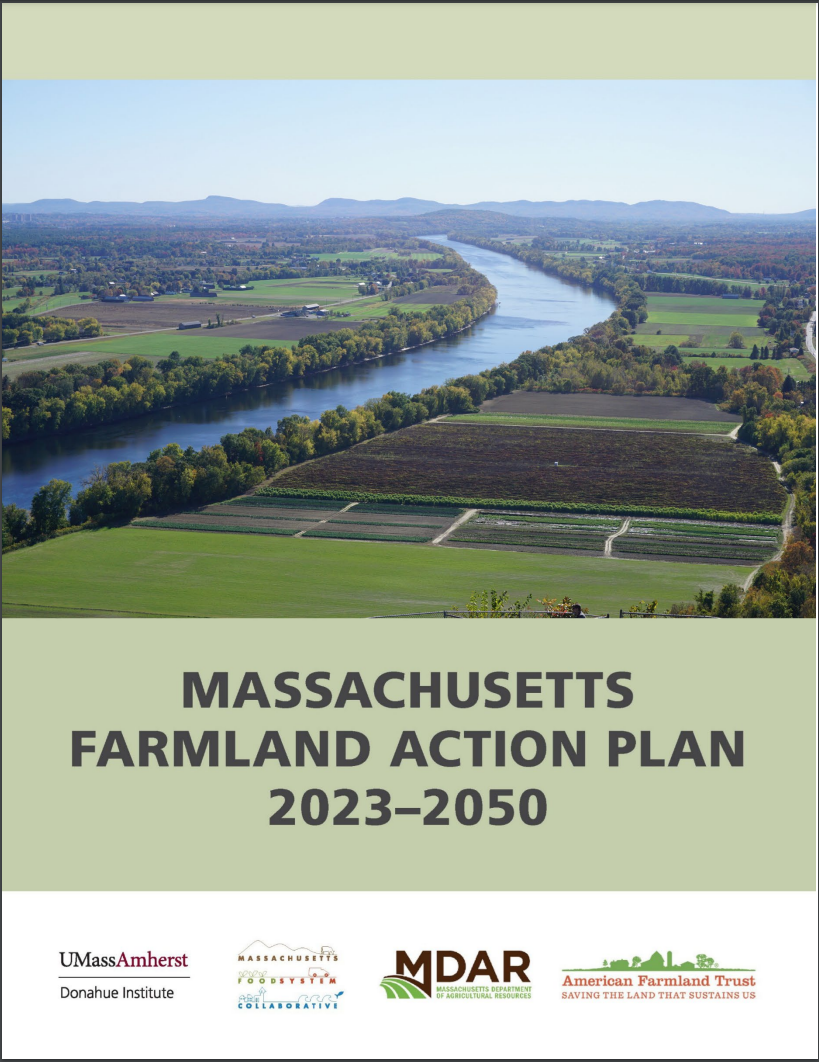
The Collaborative was glad to contribute to the state’s newly released Farmland Action Plan, after advocating for its creation a few years ago. The plan’s three primary goals of protection, access, and viability are deeply intertwined and interdependent, and it will take collaboration between many stakeholders to achieve the goals as they are laid out.
We are especially excited by many recommendations in the plan, including:
- Many changes to APR that would encourage greater coordination with federal partners, consider protecting on-farm housing in addition to the land, and measures to increase the number of applications to this and other important programs
- Allowing MDAR to purchase and hold land! And establishing an MDAR buy/protect/sell program.
- Pushing to explore and establish novel, alternative methods of land tenure to meet the needs of beginning, BIPOC, and other historically underserved communities with limited equity or credit.
- The proposed creation of a new program for local nonprofits and municipalities to purchase, hold, and steward agricultural restrictions.
- A recognition of the multiple objectives related to farm succession, especially important as many farmers are hoping to retire in the coming years.
- Specific focus on prioritizing increased access for BIPOC and historically underserved farmers in all farmland access programs and policies.
- Creating a definition of viability that includes climate change adaptation, support for urban agriculture, farm financing, and public education.
- Developing programming to educate all Massachusetts residents and elected officials about the importance of local agriculture, including curricula in K-12 education.
- Including farmers and representatives of the full range of the industry in planning and policy setting processes that impact land-use, environmental, and other public policy.
- The call to “Develop a comprehensive plan to support and sustain the state’s agricultural sector, including urban agriculture, integrating both public and private resources.”
- Incentives for municipalities and regional planning agencies (RPAs) to develop local farmland protection plans that reflect local farming opportunities and priorities.
These are all important steps in the right direction. However, the Collaborative remains concerned about the lack of specific goals in terms of acres conserved, new farmers accessing land, and equitable access to resources.
- Without setting hard metrics like number of acres conserved or percentage of farmland protected, like the state’s recently released climate report card which also speaks to natural and working lands, we risk competing with other state programs and priorities for public dollars and attention. Preventing further loss of farmland requires more specific goals and better coordination.
- Much of this work needs the support of more technical assistance from UMass Extension
- There is no specific commitment of public funds. The plan just calls for “creative financing.” That’s going to require significant attention.
- By our math, there is at least $24 million already authorized in previous environmental bonds that should be spent down to fully fund the APR program.
The release of this plan is particularly timely when we consider that 2% of MA farmers identify as farmers of color and, as noted in the plan, Massachusetts farmland is averaging roughly $13,700 per acre. Many refugee and immigrant farmers, for example those who work with World Farmers, are ready and able to take their businesses to the next level, if more land is made available at affordable prices and with long-term leases. Indigenous communities are actively fighting to reclaim their ancestral land and enact their tenure practices. Young farmers want to farm, but are unable to afford the high cost of farmland of larger parcels that older farmers looking to retire from in coming years, further exacerbating inequities.
As we work to implement this plan and the NEFNE 2030 report, and we live in an era of rapid climate change, the state’s ability to produce more of its own food is of growing importance.
Overall, this Plan is a significant step forward and makes important recommendations. Now, we look forward to working with state agencies and executive offices, the administration, the legislature, and our nonprofit and business partners to set clear goals and find the resources needed to implement recommendations in the plan. After all, a plan is only as good as the resources we invest in it. Facing climate change, persistent inequity in access to resources for BIPOC, low income and immigrant residents of the Commonwealth, and rising food insecurity, we can and must use all tools available to support the viability and protection of MA farms, farmers and farmland. We look forward to your partnership in this effort!
